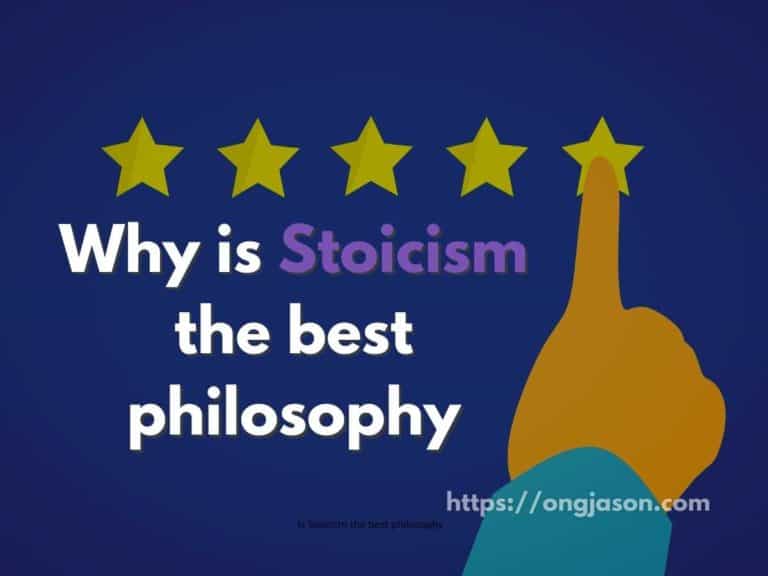Stoicism and Fate: Do Stoics Believe in Fate?
The concept of Amor Fati, or loving one’s fate, has been around for some time. However, this concept was around long before the word came to place because of Stoicism. For some, this gets confusing as Stoics seem to be rational individuals. Thus, many wonder if Stoics really believe in fate.
Stoics believe, embrace, and accept fate as they believe that fate is outside their control. They think that living according to nature or fate is logical because going against fate is fighting a losing battle. That means Stoics believe fate is a natural order, which makes them deterministic in nature.
In this blog post, I will talk about the Stoic’s belief about fate, what fate is, and how a philosophy focused on logic started to think and accept fate. Lastly, how can we improve ourselves even if we are accepting fate?

Do Stoics Believe in Fate?
Stoics are deterministic in nature, which means they believe in fate. They believe that accepting one’s fate is crucial in achieving what they call ataraxia or tranquility, which is related to happiness.
Since Stoicism is popular in the self-help industry, it can be pretty confusing to know that Stoics believe in fate.
But if we relate accepting one’s fate with happiness, this becomes easier to understand.
When we accept our fate, we begin to feel at ease despite the unpredictability of life. We believe that we are in control. We do not ask why things happen. We just accept and move on.
Stoicism helps us feel empowered because we begin not to mind the things we can’t control. We begin to filter out the things we have no power over, such as fate, and focus on what we can do to improve our lives, such as our present actions.
For example, if we break up with our partner, we can begin to question why this happened, and we might start to blame ourselves for the mistakes we’ve made.
But if we accept it as fate, we can begin to handle the problem logically. Instead of stressing over the past, we begin to find ways to improve ourselves, such as becoming better at communication.
I intended to put love as an example in this blog post since there is also a misconception that Stoics aren’t capable of loving because they are perceived as emotionless. However, that is far from the truth.
I made a blog post talking about the concept of Stoicism and love on a separate blog post. You can find it here: What the Stoics say about love?
Going back to the topic, the Stoics believe in fate because it is logical. Going against fate or what Stoics call nature only leads to discouragement or failure.
Going against fate is like fighting a losing battle. Since we can’t control the circle of events around the globe, it is useless to try changing it.
Instead, the Stoics focus on what they can change by accepting the things they have no control over.
An example is Zeno, the founder of Stoicism. Zeno gave an analogy of a dog on a wagon where the dog would be forced to go in the direction of the cart no matter if they liked it or not.
Now, please think of the direction of the cart as our fate.
Trying to stay away from fate can hurt us, and despite our efforts, our fate is our fate. So no matter what we do, it is absolute.
At least, that’s what the Stoics believe.
“When a dog is tied to a cart, if it wants to follow, it is pulled and follows, making its spontaneous act coincide with necessity. But if the dog does not follow, it will be compelled in any case. So it is with men too: even if they don’t want to, they will be compelled to follow what is destined.”
Zeno of Citium
Due to these reasons, we can say that the Stoics believe in fate.
But you can understand the topic better if you understand the Stoic’s view of fate. So that’s what we’ll talk about in the next section.
What is fate according to the Stoics?
According to Stoics, fate is a natural order that is interconnected and inviolable. It is caused by sequences of causes that are absolute. This means fate is absolute, and nothing can be done other than to accept fate. Lastly, the Stoics believe that loving our fate, no matter how difficult, is key to a peaceful life.
To understand fate in Stoicism, we have to understand nature.
Nature, according to Stoics, is absolute. It is what interconnects us, and it is inviolable. Nature is rational, and it causes a sequence of events outside our control.
If that’s familiar, that’s because Stoics believe that fate is a part of nature.
The Stoics believe that we are interconnected with each other. They call this nature, and the way nature moves its sequence of events is called fate.
For example, experiencing random weather is part of fate as it is a sequence of events we can’t control. So we can’t get mad just because it’s raining.
Since fate is heavily related to nature, the Stoics also believe that fate is absolute and there is no way to control the future.
No matter how difficult life is, we should accept that we will have bad days. We can’t always control what happens to us. We might have a good day, and the others can live the worst day of their lives. This can also occur in reverse.
In those cases, we can either give up or accept reality.
There is a difference. Giving up means trying to solve the unsolvable while accepting reality is smiling despite the adversity.
I made a blog post talking about Stoicism and nature. I can’t explain everything about nature, such as the Stoics’ belief in the two types of nature, since it isn’t relevant to the topic here. But you may read the post in this blog post if you’re interested: What is Nature in Stoicism?
But going back, this leads to more questions such as how can we improve if we only accept fate? So we are going to talk about that in the next section.
How are Logos and Fate related to Stoicism?
Logos and fate are related to Stoicism because we can only be logical when we accept that there are things we can’t control, such as fate. Stoics believe that dealing with things outside our control is irrational since it only leads to failure. Thus, this allowed humans to be free while being responsible in their lives.
As of now, you now probably understand the relationship between being rational or logos and fate.
Accepting fate is rational as going against it causes more harm than good. This is how Stoics combined the idea of logos and fate.
The Stoics believed that life is full of troubles and that a person can’t avoid them. This is fate. Thus, a person should instead be prepared for all sorts of situations and should be able to cope, which is the rational thing to do
Lastly, let’s reconcile the idea of accepting fate and improving our lives.
As someone who experienced the benefits of Stoicism, I can say that Stoicism made me resilient when stress comes to my life.
At those times, I practice Amor fati, where I accept the truth no matter how hard it is.
However, this concept is only helpful when things around us seem out of control, and while there are many things outside our control, there are also things within our control.
We have to understand that balance is key. There are times we should accept fate, and there are times where we can put matters into our hands.
You wouldn’t see this blog post if I only accepted my fate. Accepting our fate shouldn’t serve as an excuse for us not to improve our lives, especially if we don’t like our current standing.
Thus, you need to ask one question to have the right balance. Is the situation in your control?
If it is within your control, then do something about it. However, if the situation is outside your control, remember that you can always accept fate and be happy regardless of the situation.
What’s Next? Do you know the full characteristics of a Stoic? I made an entire blog post on how Stoics behave another blog post. You can find it here: What is a Stoic person like?

“Only the things I love.“
ongjason.com is reader-supported. When you buy through links on the site, I earn an affiliate commission.
If you’re following me, you’ll know that I believe it is essential to have some tools, whether it’s for personal development or lifestyle in general.
So, here are the things I love.
YouTube
If you want to learn things for free, I recommend watching my YouTube Channel. Click the Button Below to go straight into my Channel. 🙂
Okay, let me first explain my Channel.
I believe that I really can’t explain everything too well on my blog. That’s why I created a YouTube Channel so I can easily explain a lot of things. Plus, I believe that Video Sharing is the future.
Recommended Books
The next thing is books. Books are, for me, one of the cheapest ways to get invaluable information. We can learn personal development, finance, career, relationships, and many more from books.
Here, I will be listing my favorite books in different categories.
- For Beginners – 7 Habits of Highly Effective People by Stephen Covey – Personal development has a lot of concepts and ideas to learn. Thus it can be really hard for beginners to know where to start. Thus, I recommend this book since all the basic concepts of personal development are here(except finance, check what I recommended for that)
- Productivity – The One Thing by Gary Keller – This book teaches us the power of focusing on one thing which is the ultimate source of productivity. The concepts taught are what I am using to constantly publish YouTube videos while maintaining this website.
- Busy? – Make Time by Jack Knapp – This book teaches us how to make time for the things we love. The concept is really simple but I think that makes it a book worth reading.
- Health – Lifespan by Dr.Sinclair – This Book teaches about the latest scientific research on lifespan. In his book, he has shared numerous things he is doing to slow down his aging process. This can be as easy as eating less which he recommends.
- Finance – The Richest Man in Babylon by George Clason – Perhaps one of the first books I’ve read about Finance, this book for me is the best if we are talking about learning basic finance such as basic saving and investing. The concepts are very simple but effective.
Audiobooks
Take this advice as a grain of salt.
I don’t recommend buying Audiobooks one by one. I mean, audiobooks can be quickly finished by listening while working out or doing some mindless tasks.
So here is to save you some money. Just go for a monthly subscription to Audible. I believe that you will save a lot of money with that plus, they usually give freebies to anyone starting.
My Audiobook Recommendation will always be the same as my book recommendations, but I personally like The 5 Second Rule by Mel Robbins. I like how she is so casual while reading her book.






